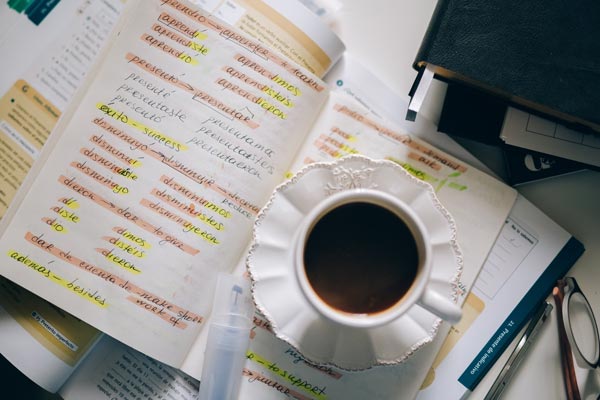Unit 1 How can we becom good learners?
Section A-1b
Boy: Hey, everybody. There’s a big test on Tuesday. I really need some help. Can you tell me how you study for a big test?
Voices: Sure! Yes. Sure we will.
Boy: You did really well on the last English test, didn’t you, Meiping?
Meiping: Yeah, I did OK.
Boy: Well, how did you study for it?
Meiping: By making word cards.
Boy: Maybe I’ll try that. So, how do you study for a test, Peter?
Peter: By asking the teacher for help. She’s always happy to answer my questions.
Boy: That’s interesting. How do you study, Tony?
Tony: I like to study by listening to tapes. But sometimes my mother thinks I’m listening to music. And then she gets mad.
Boy: Oh, maybe I won’t do that then.
Section A-2a
Man: Welcome to the English club. Today we’re going to talk about the best ways to learn English. Does anyone learn English by watching videos?
Girl 1: No. It’s too hard to understand spoken English.
Boy 1: What about keeping a diary in English? Do you learn English that way?
Girl 1: Yes, I do. It helps to write English every day.
Boy 2: Have you ever studied with a group?
Girl 2: Yes, I have! I’ve learned a lot that way.
Boy 2: Do you have conversations with friends in English?
Girl 2: Oh, yes. It really improves my speaking skills.
Girl 1: What about reading aloud to practice pronunciation?
Boy 1: I do that sometimes. I think it helps.
Girl 2: I do, too. And I often look up new words in a dictionary.
Boy 2: That’s a great idea!
Section A-2d
Jack: Annie, I’m a little nervous. I have to finish reading a book and give a report next Monday.
Annie: That doesn’t sound too bad.
Jack: But I’m a very slow reader.
Annie: Just read quickly to get the main ideas at first. Don’t read word by word. Read word groups.
Jack: But I don’t understand many of the words. I have to use a dictionary.
Annie: Try to guess a word’s meaning by reading the sentences before and after it. You probably understand more than you think.
Jack: That sounds difficult!
Annie: Well, be patient. It takes time. You can become better by reading something you enjoy every day. The more you read, the faster you’ll be.
Section A-3a
How I Learned to Learn English
Last year, I did not like my English class. Every class was like a bad dream. The teacher spoke so quickly that I did not understand her most of the time. I was afraid to ask questions because my pronunciation was very bad. I just hid behind my textbook and never said anything.
Then one day I watched an English movie called Toy Story. I fell in love with this exciting and funny movie! So I began to watch other English movies, too. Although I could not understand everything the characters said, their body language and the expressions on their faces helped me to get the meaning. I also realized I could get the meaning by listening for just the key words. My pronunciation improved as well by listening to the conversations in English movies. I discovered that listening to something interesting is the secret to language learning. I also learned useful sentences like “It’s a piece of cake” or “It serves you right.” I did not understand these sentences at first. But because I wanted to understand the story, I looked them up in a dictionary.
Now I really enjoy my English class. I want to learn new words and more grammar. Then I can have a better understanding of English movies.
Section B-1d
Ms. Manson: You look worried, Paul.
Paul: I am, Ms. Manson. I’m having trouble learning English.
Ms. Manson: You said you liked English. What’s the problem?
Paul: I can’t get the pronunciation right.
Ms. Manson: Well, listening can help. Why don’t you listen to English songs on the radio and repeat the difficult words?
Paul: That’s a good idea. But what about all the new words? I forget a lot of the new words.
Ms. Manson: You can always write the new words in your notebook and review them from time to time. You can even study on the subway on the way to school.
Paul: That might really help! Thanks.
Ms. Manson: Can you understand when people talk to you?
Paul: Well, not always. Sometimes I just don’t understand what people are saying.
Ms. Manson: Why don’t you join an English language club to practice speaking English? The English club meets after school on Tuesdays and Thursdays.
Paul: Maybe I’ll go. The only other problem is that I don’t get much writing practice.
Ms. Manson: Maybe you should find a pen pal.
Paul: That sounds like a fun way to practice writing. Thanks, Ms. Manson.
Section B-2b
How Can You Become a Successful Learner?
Everyone is born with the ability to learn. But whether or not you can do this well depends on your learning habits. research shows that successful learners have some good habits in common.
Creating an interest in what they learn
Studies show that if you are interested in something, your brain is more active and it is also easier for you to pay attention to it for a long time. Good learners often connect what they need to learn with something interesting. For example, if they need to learn English and they like music or sports, they can listen to English songs or watch sports programs in English. This way they will not get bored.
Practicing and learning from mistakes
Good learners think about what they are good at and what they need to practice more. Remember, “use it or lose it”! Even if you learn something well, you will forget it unless you use it. "Practice makes perfect." Good learners will keep practicing what they have learned, and they are not afraid of making mistakes. Alexander Graham Bell did not invent the telephone overnight. He succeeded by trying many times and learning from his mistakes.
Developing their study skills
It is not enough to just study hard. Good learners konw the best way they can study. For example, they may take notes by writing down key words or by drawing mind maps. They also look for ways to review what they have learned. They may do this by reading their notes every day or by explaining the information to another student.
Asking questions
Good learners often ask questions during or after class. They even ask each other and try to find out the answers. Knowledge comes from questioning.
Learning is a life-long journey because every day brings something new. Everything that you learn becomes a part of you and changes you, so learn wisely and learn well.
参考译文:
Section A-1b
男孩:嘿,大家。星期二有个大考。我真的需要一些帮助。你们能告诉我你们是怎么准备大考的吗?
众人:当然!是的。我们会的。
男孩:你上次英语考试考得真好,对吧,梅萍?
梅萍:是啊,我还行。
男孩:那你是怎么复习的呢?
梅萍:通过制作单词卡片。
男孩:也许我会试试。那么,彼得,你是怎么准备考试的呢?
彼得:通过向老师求助。她总是很乐意回答我的问题。
男孩:那很有趣。托尼,你是怎么学习的呢?
托尼:我喜欢通过听录音带来学习。但有时我妈妈以为我在听音乐。然后她就会生气。
男孩:哦,那我可能不会那么做了。
Section A-2a
男士:欢迎来到英语俱乐部。今天我们要谈谈学习英语的最佳方法。有人通过观看视频学习英语吗?
女孩1:没有。理解英语口语太难了。
男孩1:那用英语写日记呢?你是那样学英语的吗?
女孩1:是的,我是。每天写英语很有帮助。
男孩2:你曾经和小组一起学习过吗?
女孩2:是的,我有!我那样学到了很多。
男孩2:你和朋友用英语交谈吗?
女孩2:哦,是的。这真的提高了我的口语能力。
女孩1:大声朗读来练习发音怎么样?
男孩1:我有时会那样做。我觉得很有帮助。
女孩2:我也是。而且我经常查字典找生词。
男孩2:真是个好主意!
Section A-2d
杰克:安妮,我有点紧张。我必须在下周一前读完一本书并做报告。
安妮:那听起来不太糟。
杰克:但我读得很慢。
安妮:先快速阅读以获取主要思想。不要逐字逐句地读。读词组。
杰克:但我不理解很多单词。我不得不用字典。
安妮:试着通过读单词前后的句子来猜测单词的意思。你可能比你想象的要理解得多。
杰克:那听起来很难!
安妮:嗯,要有耐心。这需要时间。你可以通过每天阅读你喜欢的东西来变得更好。你读得越多,就会越快。
Section A-3a
我是如何学会学习英语的
去年,我不喜欢我的英语课。每节课都像是一场噩梦。老师说得太快,我大部分时间都听不懂。我害怕问问题,因为我的发音很差。我只是躲在课本后面,什么也不说。
然后有一天,我看了一部叫《玩具总动员》的英语电影。我爱上了这部既刺激又有趣的电影!于是我开始看其他英语电影。虽然我不能完全理解角色们说的话,但他们的肢体语言和面部表情帮助我理解了意思。我还意识到,我可以通过只听关键词来理解意思。通过听英语电影中的对话,我的发音也得到了改善。我发现听有趣的东西是语言学习的秘诀。我还学到了有用的句子,比如“小菜一碟”或“活该”。我起初不理解这些句子。但因为我想理解故事,所以我在字典里查了它们。
现在我真的很喜欢我的英语课。我想学习新单词和更多的语法。这样我就能更好地理解英语电影了。
Section B-1d
曼森女士:你看起来很担心,保罗。
保罗:是的,曼森女士。我学英语有困难。
曼森女士:你说你喜欢英语。有什么问题吗?
保罗:我发音发不准。
曼森女士:嗯,听可以帮助你。你为什么不听听电台上的英语歌曲并重复难词呢?
保罗:这是个好主意。但是生词怎么办?我忘记了很多生词。
曼森女士:你可以把生词写在笔记本上,并时不时地复习它们。你甚至可以在上学的地铁上学习。
保罗:那可能真的很有帮助!谢谢。
曼森女士:你能理解别人和你说话吗?
保罗:嗯,并不总是。有时我就是不明白人们在说什么。
曼森女士:你为什么不加入一个英语俱乐部来练习说英语呢?英语俱乐部在星期二和星期四放学后开会。
保罗:也许我会去。唯一的其他问题是,我没有多少写作练习。
曼森女士:也许你应该找个笔友。
保罗:那听起来是个有趣的练习写作的方式。谢谢,曼森女士。
Section B-2b
你如何成为一名成功的学习者?
每个人天生都有学习的能力。但你是否能做好这件事取决于你的学习习惯。研究表明,成功的学习者有一些共同的好习惯。
对学习内容产生兴趣
研究表明,如果你对某件事感兴趣,你的大脑会更活跃,你也更容易长时间地关注它。好的学习者经常把他们需要学习的东西和有趣的东西联系起来。例如,如果他们需要学习英语并且他们喜欢音乐或运动,他们可以听英文歌曲或看英文体育节目。这样他们就不会感到无聊。
从实践中学习和从错误中学习
好的学习者会思考他们擅长什么以及他们需要练习什么。记住,“用进废退”!即使你学得好,如果你不使用它,你也会忘记它。“熟能生巧”。好的学习者会不断练习他们所学的东西,并且他们不害怕犯错误。亚历山大·格拉汉姆·贝尔并不是一夜之间就发明了电话。他是通过多次尝试并从错误中学习才成功的。
发展他们的学习技能
仅仅努力学习是不够的。好的学习者知道他们能以最佳方式学习。例如,他们可能会通过写下关键词或绘制思维导图来做笔记。他们也会寻找复习所学内容的方法。他们可能会通过每天阅读笔记或向另一位学生解释信息来做到这一点。
提问
好的学习者经常在课上或课后提问。他们甚至互相提问并试图找出答案。知识来源于质疑。
学习是一场终身的旅程,因为每一天都会带来新的东西。你所学的每一样东西都会成为你的一部分并改变你,所以要明智地学习,并学得好。








